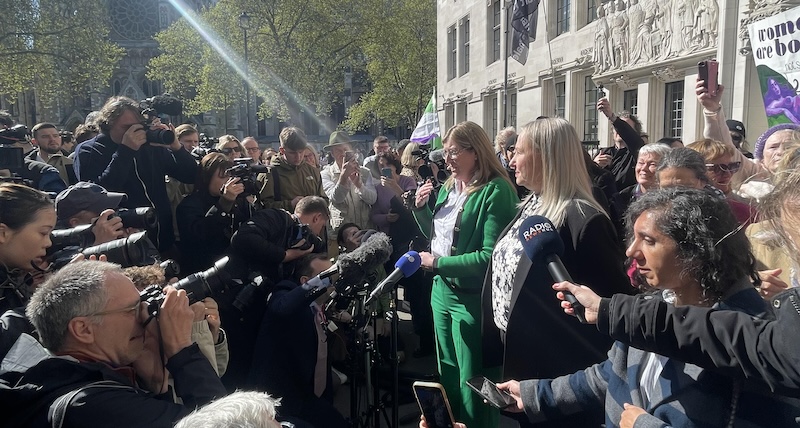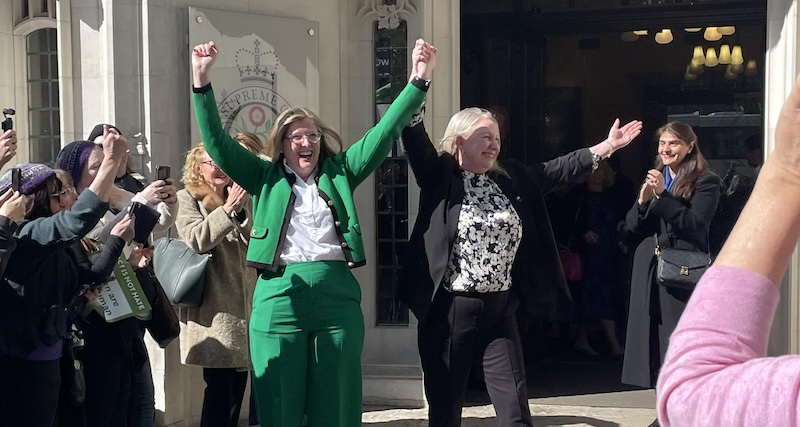Top judges unanimous decision that ‘man’ and ‘woman’ in UK equality legislation mean biological sex

In a dense, 87-page judgment, the Supreme Court has found that UK equality legislation refers to biological sex “as a matter of ordinary language”.
Interpreting ‘sex’ as including trans men or women who have a Gender Recognition Certificate would not have been workable as a matter of statutory interpretation, and “would cut across the definitions … in an incoherent way”.
The decision has implications for public service providers and employers as well as charities and associations. It means, for example, an interpretation of what is a ‘women-only’ space such as a changing room, or of a charity set up to serve women or girls, would be based on a biological definition of ‘woman’ and would not cover transgender men or women with a GRC.
Acknowledging the competing rights that this controversial case highlighted such as for women, for the trans community as well as for lesbian women, Lord Hodge, one of the five justices that heard the case, said, “we counsel against reading this judgment as a triumph of one or more groups in our society at the expense of another”, reiterating, for instance, that the transgender community is separately protected in the Equality Act 2010.
The case was brought before the Supreme Court after the Scottish Government issued statutory guidance north of the border in relation to ‘positive action’ legislation on gender representation on the boards of public bodies. The guidance says that the definitions of woman and man for that legislation includes those who have been certified as such with a Gender Recognition Certificate.

For Women Scotland, the organisation which brought the case, argued this was wrong and that the UK’s Equality Act 2010 was drafted with the ordinary biological meaning of woman and man in mind and that those definitions should not be read as to include trans women or men with a Gender Recognition Certificate. The Supreme Court has now agreed with this argument.
In a statement, For Women Scotland, said today:
“The Supreme Court has confirmed what women across the country already knew. Sex matters … This ruling restores legal clarity and reaffirms the purpose of the protections written into the Equality Act. This win protects all women, including trans-identifying females, by ensuring maternity rights, women-only spaces, and female-focused services are grounded in reality.”
The 268 paragraphs of complex legal analysis in the judgment (written by three of the five justices, Lady Rose, Lady Simler and Lord Hodge) may make for a challenging read but, say equality legal experts, offer “long-term clarity for businesses”.
A Scottish government spokesperson said: “We will be engaging with the UK Government to understand the full implications of this ruling … and we will engage with the Equality and Human Rights Commission as a matter of urgency on the need to review its guidance considering this judgment. Finally, we want to reassure everyone that the Scottish Government is fully committed to protecting everyone’s rights, to ensure that Scotland remains an inclusive country.”
Phillip Pepper, employment partner at law firm Shakespeare Martineau, says: “While this decision will be disappointing for some, it ultimately offers a clear path forward for employers who can now ensure they stay on the right side of law.”
This does mean that separate spaces may have to be created, for instance, for the trans community. Pepper cautions, businesses “may have to rethink their policy towards single-sex spaces in the workplace, such as bathrooms and changing rooms, and ensure that all individuals have a suitable space that they feel comfortable in when needing to use those facilities”.
As Pepper makes clear, these practical applications are now matters for service providers and employers; the judges have done their bit.
As Lord Hodge said, the Supreme Court’s task “was not to make policy on how .. groups should be protected” but only to “ascertain the meaning of the legislation”.
The post Supreme Court rules ‘woman’ has biological meaning appeared first on Legal Cheek.
